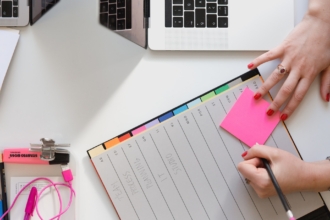I was having an uneventful afternoon, so, like I often do, I reached for my phone. After 20 minutes on Twitter and a few more reading the news, I wasn’t bored anymore — but I didn’t exactly feel good, either.
It was like someone had hijacked my body.
My jaw was clenched, my shoulders tense, and my stomach-turning. Somehow, even through my mostly mindless scroll, my nervous system picked up on all the negativity littering my feed.
By the time I had to get back to work, I found myself struggling to focus. I felt foggy and irritable, and I wished I had never picked up my phone in the first place.
That’s your brain on social media. Add a global pandemic and divisive political landscape, and the effects can be even worse.
There’s plenty of evidence that, in general, social media can have a negative impact on mental health, increasing people’s risk for low self-esteem and even depressive symptoms.
And recent research shows that impact has increased during COVID-19. In fact, the more a person uses social media during the pandemic, the more they’re at risk for depression.
During a time when mental health is already fraught, it’s important to do everything you can to protect yourself.
What “bad news” does to your brain and body
Early on in the COVID-19 pandemic, like most of us, I clung to my phone. I set alerts for news about lockdowns and new cases, I scrolled Twitter hourly to find out where the virus was spreading, and I checked in on Facebook to see if my loved ones across the world were OK.
It wasn’t long before I realized how much my social media habits were impacting my mind and body.
Checking social media may seem like a good way to stay safe and informed, but too much “bad news” has the potential to interfere with your mental health in major ways.
Why is social media such a risk to well-being? Simply put, the human brain isn’t wired to consume that much negative information in a short amount of time.
Mental health experts call our constant consumption of negative content “doom scrolling.” And that “mindless” Instagram scroll doesn’t just derail your mood; it also triggers the stress response, a cascade of hormones that prepares your body to act against a threat.
You need that adrenaline boost when you’re fighting off, say, a wild bear. The problem is, when there’s no predator to fight against, the stress sticks around. That’s when it can become harmful.
Stress affects your body in a number of ways. Here are a few ways social media can impact your brain — and ultimately, your functioning.
It limits your executive functioning
Have you ever noticed that when you’re stressed, you lose the ability to think clearly? That’s because your brain’s devoting its capacity to dealing with the stressor.
When stress hormones are raging through your body, the part of your brain that’s required for executive functioning — important in tasks that require memory, problem-solving, and logical thinking — essentially turns off. Creativity and innovation will take a toll, too.
Simple mindfulness exercises can help restore your executive functioning, but limiting the stressor — in this case, the negative — plays an important role, too.
It rewires your brain for instant gratification
Constantly checking your phone can also impair your attention span. Social media (and the internet, in general) train your brain to crave instant gratification, which can interfere with your ability to focus for longer periods of time.
That means you may struggle with tasks that don’t provide an immediate dopamine release, from conversations with loved ones to mundane tasks at work.
If you’re consistently using social media that gives instant “feedback” through likes, you may lose touch with your own, personal standards for success, too.
The bottom line is, if your goal is to live an engaged, mindful life, constantly scrolling probably isn’t helping.
It TKTKTK
Social media is full of “hot takes” — opinions that may or may not be informed by facts. You may not think other people’s posts, while they may range from irritating to anger-inducing, affect you all that much.
Too much time spent on social media, however, can inhibit your ability to create your own opinions about something. Research suggests social media use can trigger a phenomenon called herd mentality, where people tend to believe what’s most popular. Down the road, that means you may also lose the skills that help you think and make decisions for yourself.
It distorts your worldview
For all the “highlight reel” moments on social media, there’s just as much negativity — misinformation, sensationalizing, and of course, the occasional critical post from college friends.
When you log on to your social media account, you have no control of what you’ll see (and your knee-jerk response to the content you stumble upon).
Over time, all this negative input puts you at higher risk for a depressed mood which, in turn, enhances your negative bias.
Life is already hard right now. Constantly exposing yourself to the bad stuff wires your brain to dwell on the gloom — as one psychologist put it, throwing a dark filter on how you see the world — all the while causing you to be “out of practice” in positive, gratitude-based thinking that’s shown to improve mental health.
How to form a realistic, healthy relationship with social media
I’m grateful for the internet. I wouldn’t have a job without it. But in the age of COVID-19 pandemic, when both the news cycle and people’s opinions have taken a grim, divisive turn, my go-to social networking sites may feel more threatening than beneficial.
That doesn’t necessarily mean ditching social media altogether — you may just need a more strategic approach.
For me, it’s helpful to schedule social media use during times I don’t have other responsibilities. For example, I try not to look at my phone in the morning; instead, I practice mindfulness and gratitude journaling, which set a more positive tone for my day.
I also don’t use social media when I need the mental capacity to do something else, because I’ve noticed it can interfere with my focus. The same goes for before bed — I’ve realized how valuable sleep is for my mental health and ability to perform on the job, so I try to put my phone away after dinner.
With a few simple buffers in place, I’m learning how to get the most out of social media without letting it dictate my well-being. It might take some discipline for you to do the same thing, but your boundaries will pay off — and I have a feeling they’ll show up on your gratitude list down the road.













Send Comment: